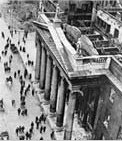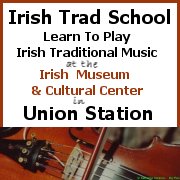Co-existence: Kansas City & the Lebanon
As an outsider, one of the surprises about Kansas City is the racial separateness of its subdivisions. You can draw lines on the map that define not only where people reside, but the extent to which their entire lives in the city are contained.
Some of the edges are blurred a little, like where I lived in midtown, but most are hard lines. So being one of little more than a handful of Irish people, and white, and choosing to live on the Missouri side of the city, my life is then mostly contained in a narrow corridor with the odd excursion west into Kansas, and even rarer ones east.
It’s as if people have chosen to do nothing more than co-exist, with no time nor tolerance for love or friendship. Even if this co-existence is helped by people with financial interests who happily capitalize the prejudices of others.
When Irishman Brian Keenan, after almost five years as a hostage in the Lebanon, was released the impact on Ireland was enormous. In truth it was actually Brian himself, his words, which created that impact rather than just the release. With Terry Waite’s work, and subsequent incarceration, along with Jill Morrell and the Friends of John McCarthy, and the non-stop efforts of Keenan’s sisters, the hostages were always in the public eye and the build up to their release was immense.
But it was when Brian Keenan spoke, with dignity, eloquence, and power, that a nation was lifted. At the time I was flitting between England and Ireland and the reaction to Keenan’s release among the Irish was much stronger than what I witnessed regarding the more popular McCarthy and more private Waite, among the English.
Everybody everywhere was talking about Keenan. They had seen him in Howth, in town, in the pub. He was sainted. Ireland was proud. Proud that one of her own could suffer so and yet come out speaking in a way everybody wished they could speak. People of all ages, unsolicited, would tell you how great he was. This would happen when you went around the corner to the shops. Or when you visited your aunt’s. Or when you went for a pint.
I read Keenan’s account of his time in Lebanon, An Evil Cradling, one week I spent alone on the Sligo coast as the Atlantic spilled onto the cliff road outside the window. It’s an amazing book by a writer talented way beyond recounting being a hostage.
This year Brian Keenan was about to return to the Lebanon, with his young family, to visit the country and people he still loves. With the current violence between Hizbollah and the Israeli Defence Forces, and all the civilians in between, Keenan has put off his return to the land where he was a hostage.
In today’s Guardian in Britain Keenan writes a moving article in which he remembers the Lebanon before his capture, and since the end of the Civil War. But mostly it is a call for co-existence:
Coexistence is the minimal, least demanding way for people to relate to one another without violence. It is not the same thing as love, or even as friendship. On the contrary, it is an expression of distance, an acknowledgment that boundaries will remain. It is informed by an attitude of live and let live
Rather than listen to what the spokespeople for all the various sides say about their reasons for killing, you could read all the words of Brian Keenan.
See Also:
• Drinking in Kansas City
• Bobby Sands
• Black Shamrock and W
• Irish Place Names and Illegals

 Eolaí gan Fhéile:
Eolaí gan Fhéile:










